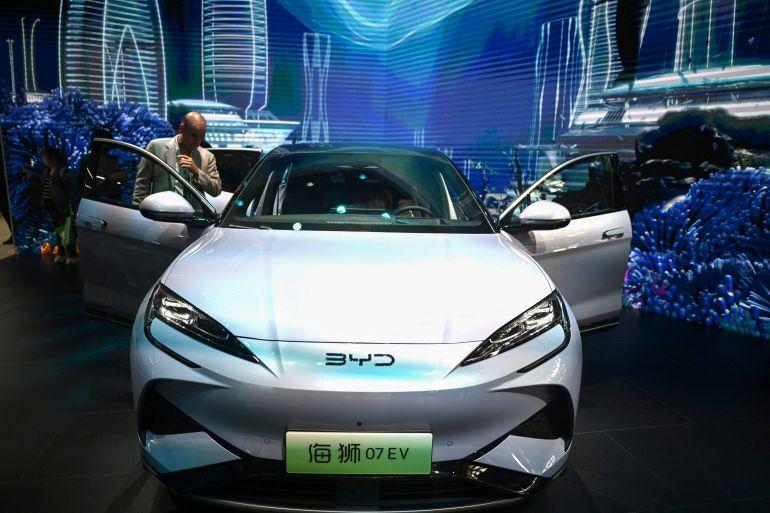Source: ALJAZEERA
ALJAZEERA MEDIA NETWORK

Chinese electric vehicles confront numerous tariffs in Western markets amid concerns about competitive pricing with local brands.
Taipei, Taiwan – Earlier this year, electric car enthusiast Anders Berner eagerly tried the BYD Seal sedan outside Copenhagen.
Berner was already impressed by the swift progress of Chinese EV manufacturers like BYD Auto.
“Many Chinese EVs are made with excellent materials and have been put together well – they are high-quality cars,” Berner, a mechanical engineer by trade, told Al Jazeera.
“And in terms of battery technology for EVs, Chinese companies are leading the field.”
Berner is among those who believe that Chinese EVs have the qualities needed to become the dominant player in the global car market.
Compared with Western brands, Chinese EVs have a leg-up in terms of affordability.
In the European Union, Chinese EVs typically sell for 20 percent less than EU-made models, according to the European Commission.
Chinese battery maker CATL, which supplies Tesla, Volkswagen, and BMW, alone provides about 40 percent of the world’s EV batteries and recently unveiled a battery with a range exceeding 1,000 kilometers per charge.
Chinese EVs are increasingly making their mark overseas.
Shenzhen-based BYD sold 525,409 EVs globally in the last quarter of last year, surpassing Tesla's 484,507 units.
China narrowly missed becoming the world’s largest car exporter, selling 5.22 million vehicles abroad.
In the European Union, Chinese EVs increased their market share to 8.2 percent in 2023, up from 0.5 percent in 2019.
The European Federation for Transport and Environment has projected that market share to rise to 11 percent this year and as high as 20 percent by 2027.
However, growing concern in Western capitals is threatening Chinese EVs’ quick rise.
US President Joe Biden has portrayed China's industrial policy as a national security threat, vowing to prevent Chinese vehicles from overwhelming the US market.
“I am not going to let that happen on my watch,” Biden said in March.
Although the Chinese market share of EVs sold in the US is already negligible, Biden in May announced plans to quadruple tariffs on Chinese EVs to 100 percent and triple tariffs on Chinese lithium-ion EV batteries to 25 percent.
The EU has mirrored these concerns.
On Wednesday, the EU Commission stated that new duties between 17.4 percent and 38.1 percent will be imposed on Chinese EVs starting July 4 unless Beijing offers a “solution” to subsidies that the bloc claims distort the market.
These tariffs, in addition to an existing 10 percent duty, come as the EU attempts to curb Chinese EV imports without triggering a trade war.
So far, Beijing has called the EU tariff hikes a “typical case of protectionism” and vowed to “take all necessary measures” to protect its interests.
The China Passenger Car Association said a 20 percent tariff hike would be “understandable” due to the auto sector’s crucial role in Europe.
The auto industry provides about 13.8 million jobs in the EU, roughly 6 percent of all employment.
In the US, about 9.7 million jobs, or around 5 percent of private-sector employment, depend on the industry.
EU measures to address fears of losing jobs to Chinese EVs could undermine efforts to reduce carbon emissions and fight climate change.
The US government aims to end purchases of fossil fuel cars by 2035, with several states including California planning to end sales of gasoline-only vehicles by the same year.
The EU intends to ban sales of new petrol and diesel cars from the same date.
Toender warns that these goals will be unattainable without accessing the Chinese EV industry, as Europe accounts for less than 10 percent of global battery production compared to China’s 76 percent.
“There isn’t sufficient battery capacity elsewhere to replace the Chinese production,” Toender said.
“So, the global expansion of the Chinese EV industry could very well be determined by how the West prioritizes its climate targets versus minimizing imports from China.”
Meanwhile, Beijing views the EV industry as integral to China’s future economic growth, noted Kasper Ingeman Beck, a postdoctoral scholar of China’s political economy at Copenhagen Business School.
In 2015, the Chinese government emphasized “new energy vehicles” as key to the country's prosperity under its “Made in China 2025” plan.
Beck explains that China sees a decade or so window to leverage and shape new technological transformations that could elevate the country from a middle-income to a high-income status through substantial financial support to select industries.
This emphasis has resulted in a crowded field of Chinese EV manufacturers supported by public funds, which Toender believes is unsustainable in the long run.
“Chinese car companies are currently in a fierce competition to remain standing,” he said. “As a result, we see rapid innovation and low pricing among Chinese manufacturers.”
This competitive environment has led to an excess production of 5 to 10 million vehicles each year, many of which end up exported.
“These exports are an unintended consequence of China’s investment-led economic model rather than a deliberate strategy,” Beck explained.
According to Toender, the Chinese government likely isn’t trying to flood Western markets with excess EVs deliberately.
“That would cause a significant backlash and shut out Chinese manufacturers for good,” he said. “The Chinese EVs in the European market are priced higher than in China.”
In some cases, BYD charges two or three times more for some models in Europe compared to China.
Toender sees this as a strategy for establishing a long-term market presence rather than seeking a quick profit.
In Copenhagen, Berner felt his test drive of the BYD Seal was not particularly impressive.
“It’s up to standard, but it doesn’t excel,” he said, adding that many Chinese EVs lack the fine-tuning of their European counterparts. “There is room for improvement.”
Despite these pressures, Berner believes Chinese EVs will become increasingly common on European roads.
“I think we will eventually come to accept Chinese EVs,” he stated.
Your email address will not be published. Required fields are marked *